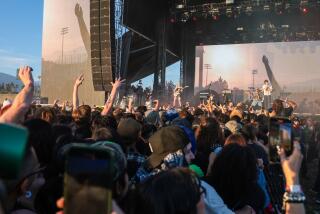‘Solitaire’ Endeavor Shows Wider Scope of Ness’ Talents
- Share via
“Proceed with caution” may not be the expected watchword for one of Southern California’s most accomplished, authentic and emphatic punk rockers, but that was the gist of Mike Ness’ show Monday at the Coach House in San Juan Capistrano.
It was Ness’ first home-county concert apart from Social Distortion, his band of 20 years, and just the third Ness has played since forming a new touring band to perform material from his first solo album, “Cheating at Solitaire.”
The album, a strong one, takes no radical departures from the themes of emotional turbulence and struggle against self-destruction that Ness typically has explored as singer-songwriter-bandleader of Social Distortion, which is on extended hiatus. But it does broaden his palette of rhythms, sounds, dynamics and moods, and it features the first tender ballads of Ness’ career.
Those ballads, “Rest of Our Lives” and “If You Leave Before Me,” are exceptional, and ideally Ness would have made them focal points of the show. But he failed to emphasize the recorded versions’ coursing, folkish charms and to fully exploit their warmhearted shift from his darker norm; “Rest of Our Lives” came off as a lively, enjoyable but unremarkable country two-step, and “If You Leave” received a clatter-along country train rhythm. Subtler, folk-oriented arrangements using brushes instead of drumsticks would have served them better and given Ness a way to really plunge into something new.
Between-songs storytelling would have been another way to bring something sharply different to his solo show and make it more intimate, but Ness, 37, stuck to the same short, flinty-humored, sometimes profane remarks that pepper his Social Distortion performances.
In bearing, he was the same proud, swaggering tough-guy as ever, trading in his Social Distortion gangster’s fedora for a Western outlaw’s black cowboy hat in keeping with the country flavor of many of the songs.
The show closely followed the running order of “Cheating at Solitaire,” making a few switches and leaving out just one song, the sultry, after-hours swing-blues, “Crime Don’t Pay.”
And it didn’t lack for highlights.
Ness created a vivid moment with Hank Williams’ “You Win Again,” his chesty voice cracking with a time-honored country sob, and matched its intensity with the dramatic, seething anger of “No Man’s Friend.”
Another vocal highlight was his reading of Bob Dylan’s “Don’t Think Twice, It’s All Right,” done as an up-tempo country-rocking number; Ness has “pain” and “love” tattooed on either hand, and his singing swung between those poles, now disdainful, now letting the hurt of love show through.
“Misery Loves Company,” which on record features a vocal duet with Bruce Springsteen, was a propulsive, brooding yet triumphant rocker, with Sean Greaves, a former Social D roadie, playing a fiery, clanging slide guitar. “Cheating at Solitaire,” with its swaying, chanty-like waltz tempo, added a good, folkish dimension at mid-set.
With Social Distortion, Ness’ voice--raw, gruff and limited in range and decoration--always has his trusty, Neil Young-like melodic guitar leads for effective accompaniment. Solo, he just thickened the sound on rhythm guitar.
His band, which has been together for a matter of weeks, needs to coalesce to provide the nuance and lyricism that could complement and accent Ness’ singing. Playing just its third show, it has a way to go.
Ness could do more to project a sense of band-ness: he didn’t introduce the players (Greaves, pedal-steel player Chris Lawrence, veteran L.A. rock drummer Charlie Quintana, and bassist Johnny Rioux, a.k.a. veteran Southland roots-rocker Johnny Ray Bartel) nor did he relinquish the spotlight while Greaves or Lawrence took solos.
Ness was rapturously received by the packed house of nearly 500 fans, a few of whom found so much continuity with a Social Distortion show that they tried to stage dive and play bait-the-bouncer during encore versions of two SD songs, “Bad Luck” and “Ball and Chain.”
Ness strummed his way through “Bad Luck” without accompaniment; he should have stayed on that track for several more songs--both to fill out the short 70-minute set, and to showcase Social Distortion songs that seldom get a live hearing, such as “Down Here With the Rest of Us” and “Untitled,” two tracks from the band’s last studio album that presaged the incremental change of his solo debut.
Showing a different face to the folks who have known you longest and best isn’t an easy thing to do; maybe while he is off on tour, Ness will become more comfortable drawing sharper lines between his past and his present.
More to Read
The biggest entertainment stories
Get our big stories about Hollywood, film, television, music, arts, culture and more right in your inbox as soon as they publish.
You may occasionally receive promotional content from the Los Angeles Times.











